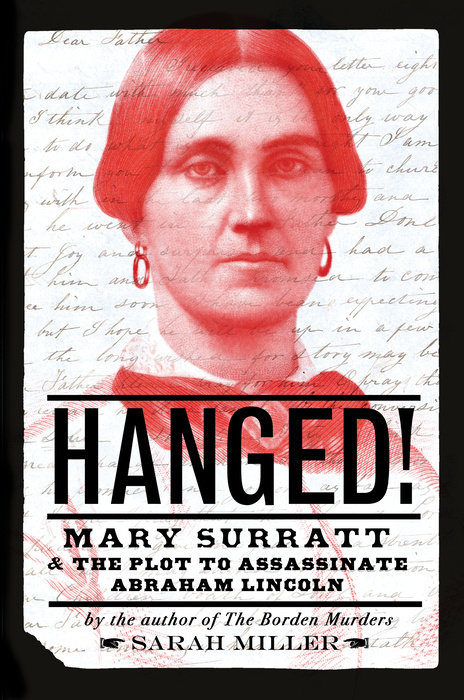Hanged!
Author Sarah Miller
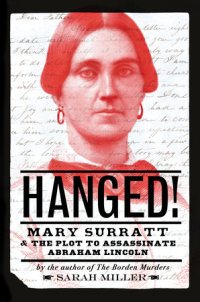
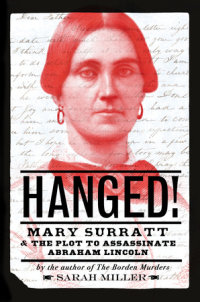
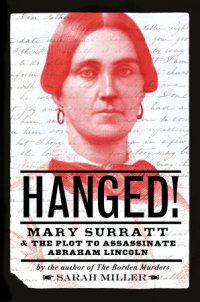
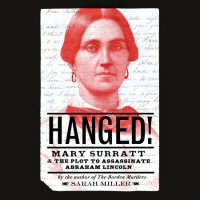
Hanged!
From the critically acclaimed author of The Borden Murders comes the thrilling story of Mary Surratt, the first woman to be executed by the US government, for her alleged involvement in the plot to assassinate Abraham Lincoln.
A dubious distinction belongs to Mary Surratt: on July 7, 1865, she became the first woman to be executed by the United States government, accused of conspiring in the plot to assassinate not only President Abraham Lincoln, but also the…
From the critically acclaimed author of The Borden Murders comes the thrilling story of Mary Surratt, the first woman to be executed by the US government, for her alleged involvement in the plot to assassinate Abraham Lincoln.
A dubious distinction belongs to Mary Surratt: on July 7, 1865, she became the first woman to be executed by the United States government, accused of conspiring in the plot to assassinate not only President Abraham Lincoln, but also the vice president, the secretary of state, and General Grant.
Mary Surratt was a widow, a Catholic, a businesswoman, a slave owner, a Union resident, and the mother of a Confederate Secret Service courier. As the proprietor of the boardinghouse where John Wilkes Booth and his allies are known to have gathered, Mary Surratt was widely believed, as President Andrew Johnson famously put it, to have “kept the nest that hatched the egg.” But did Mrs. Surratt truly commit treason by aiding and abetting Booth in his plot to murder the president? Or was she the victim of a spectacularly cruel coincidence? Here is YA nonfiction at its best--gripping, thought-provoking, and unputdownable.
An Excerpt fromHanged!
Chapter One
Washington City, April 15, 1865
It was two or three o’clock in the morning when the bell of Mary Surratt’s boardinghouse at 541 H Street rang “very violently.” On the third floor, twenty-two-year-old Louis Weichmann, a former college chum of Mary’s younger son, roused himself from bed. After pulling on a pair of pants under his nightshirt, he ran barefooted down the stairs. Weichmann did not open the door immediately. Wary of middle-of-the-night visitors, he tapped on the inside of the front door to let whoever had clanged the bell know that they should stop.
“Who is there?” Weichmann asked.
“Government officers, come to search the house for John Wilkes Booth and John Surratt,” came the prompt reply.
Louis Weichmann had seen John Wilkes Booth—one of the most famous actors in America—that very afternoon. Booth had stopped by to speak with Mrs. Surratt just before Weichmann had driven her into the countryside on an errand. However, Weichmann and Booth’s mutual friend, Mary’s son John Surratt Jr., had left for Canada over a week before. Through the closed door, Weichmann informed the…
Chapter One
Washington City, April 15, 1865
It was two or three o’clock in the morning when the bell of Mary Surratt’s boardinghouse at 541 H Street rang “very violently.” On the third floor, twenty-two-year-old Louis Weichmann, a former college chum of Mary’s younger son, roused himself from bed. After pulling on a pair of pants under his nightshirt, he ran barefooted down the stairs. Weichmann did not open the door immediately. Wary of middle-of-the-night visitors, he tapped on the inside of the front door to let whoever had clanged the bell know that they should stop.
“Who is there?” Weichmann asked.
“Government officers, come to search the house for John Wilkes Booth and John Surratt,” came the prompt reply.
Louis Weichmann had seen John Wilkes Booth—one of the most famous actors in America—that very afternoon. Booth had stopped by to speak with Mrs. Surratt just before Weichmann had driven her into the countryside on an errand. However, Weichmann and Booth’s mutual friend, Mary’s son John Surratt Jr., had left for Canada over a week before. Through the closed door, Weichmann informed the officers that neither of the men they sought was inside.
“Let us in anyhow,” the voices outside demanded, “we want to search the house.”
But it was not his house. Weichmann was only a boarder, renting his bed and eating his meals in Mrs. Surratt’s dining room. He could not let a group of unknown men into a lady’s home in the middle of the night without her permission, and Weichmann told them so.
The officers waited on the porch while Weichmann hurried down the hall and past the parlor to Mary Surratt’s bedroom door.
Another boarder, seventeen-year-old Honora Fitzpatrick, who shared a bed with Mrs. Surratt, had also been awakened by the clanging doorbell. Now she heard Weichmann’s gentler knock and his voice calling softly through the door. “Mrs. Surratt, there are detectives who have come to search the house, and would like to search your room.”
Honora Fitzpatrick and Louis Weichmann would remember vastly different reactions from their landlady—so contradictory in tone and manner, in fact, that it seemed they might have been in the presence of two different women.
One of Mary Surratt’s young boarders reported her reply thus: “Mr. Weichmann, ask them to wait a few minutes, and I will open the door for them.”
The other would insist for decades afterward that she had said, “For God’s sake, let them come in; I expected the house to be searched.”
At that moment, this detail mattered little. Whatever Mary Surratt’s response, the officers were admitted—six or eight of them, as Louis Weichmann remembered it. There were men stationed in front of the house, and men in the alley behind it. Two detectives went directly to the attic, where Mary Surratt’s daughter and teenage niece shared a room. Before Weichmann had time to dress, two more men went into his room and peered under the bed and into the closet before examining everything else in sight.
“For God’s sake, gentlemen, what means this search of the house so early in the morning?” Weichmann implored.
The young man’s confusion startled the officers. “Do you pretend to tell me, sir, that you do not know what has happened last night?” one of them asked. Louis Weichmann insisted that he was completely bewildered.
“I will tell you,” said one of them, Metropolitan Police detective John Clarvoe, and he drew a crimson-stained piece of a cravat from his pocket. “Do you see that blood?” Clarvoe asked, brandishing the torn necktie. “That is Abraham Lincoln’s blood; John Wilkes Booth has murdered Abraham Lincoln, and John Surratt has assassinated the Secretary of State.”
Stunned into momentary silence, Louis Weichmann followed the two detectives back downstairs, and arrived just as Mary Surratt was emerging from her room. “What do you think, Mrs. Surratt?” Weichmann said. “President Lincoln has been murdered by John Wilkes Booth, and the Secretary of State has been assassinated!”
Mary Surratt threw up her hands in astonishment. “Oh, my God, Mr. Weichmann, you don’t tell me so!” she exclaimed.
Chapter Two
Four hours earlier, Abraham Lincoln had been seated in the president’s box in Ford’s Theatre, chuckling at a line of the comedy Our American Cousin, when a .44-caliber lead ball fired from a single-shot derringer pistol smashed into the left side of his skull and bored its way through the center of his brain.
The revolver’s abrupt report startled the actors, who knew there were no gunshots in this production. The audience, however, did not immediately react. The play had already been interrupted once, by President Lincoln’s own arrival at the theater twenty minutes after the curtain had lifted. One of the actors on the stage had improvised a line to alert the theater to the president’s entrance: “This reminds me of a story, as Mr. Lincoln says . . .” Understanding this impromptu cue, the orchestra launched into a rendition of “Hail to the Chief” as Abraham Lincoln; his wife, Mary; and their guests, Major Henry Rathbone and Miss Clara Harris, made their way to the box that had been specially furnished and decorated in the president’s honor.
The spectators treated Lincoln to a hero’s welcome. After four years of war at a cost of over 650,000 American lives, Confederate general Robert E. Lee had finally surrendered the Army of Northern Virginia to General Ulysses S. Grant on April 9. Abraham Lincoln had preserved the Union, just as he had promised to do.
President Lincoln acknowledged the standing ovation and “vociferous cheering” with a bow, then settled into a rocking chair in the corner of his flag-draped box to indulge in a long-overdue evening of diversion. “Mrs. Lincoln rested her hand on his knee much of the time,” one theatergoer noticed, “and often called his attention to some humorous situation on the stage. She seemed to take great pleasure in witnessing his enjoyment.”
Now, seeing a flash and hearing a crack like fireworks, the audience waited to discover what additional surprises might be in store. Indeed, a special song had been composed in the president’s honor and was scheduled to be performed by the entire company after the main production, as a kind of patriotic encore.
Major Rathbone, seated at the far end of the box, was the first to realize what had happened. “I heard the discharge of a pistol behind me, and, looking round, saw, through the smoke, a man between the door and the President. At the same time, I heard him shout some word, which I thought was ‘Freedom!’ I instantly sprang towards him, and seized him.”
Wresting himself free, the shooter lunged at Rathbone’s chest with a knife of considerable length. The major parried the blow, and the blade slid into the crook of Rathbone’s left arm like a sword into a sheath, slicing through several inches of muscle between the elbow and shoulder. Rathbone managed only to snatch at the man’s clothes as the shooter rushed toward the front of the box and vaulted over the rail.
Below, the astonished—perhaps even delighted—spectators watched a pale, dark-haired man make a catlike twelve-foot leap from the president’s box to the stage. A portion of an American flag, caught by his spur as he jumped, trailed like a banner behind him.
Some witnesses heard the assassin shout “Sic semper tyrannis!” (Latin for “Thus always to tyrants”) as he paused in the footlights with his knife held aloft before making his exit. Others reported the exclamation as “Revenge for the South!”
It was not the first time that pale, dark-haired man had been seen center stage. Several actors and spectators alike recognized him immediately as John Wilkes Booth, a member of one of America’s most prominent families of actors. His presence now, in what seemed to be the most startling of cameo appearances, made no sense.
Booth had timed his attack exquisitely. He knew the play—knew that the audience would be laughing the moment he pulled the trigger, and that there would be but a single actor on the stage who might attempt to intercept him as he fled. His plan worked nearly to perfection. In that brief moment of triumph, Booth had no better accomplices than astonishment and confusion.
“Stop that man!” Major Rathbone cried from above. Only one member of the audience had the presence of mind to bound over the orchestra pit and pursue Booth as he dashed across the stage and out a rear door to the alley, where his horse stood waiting.
Up in the box, Rathbone peered through the gunpowder haze toward the president and understood at once that he was mortally wounded. Mary Lincoln’s hand was on her husband’s arm. Abraham Lincoln’s eyes were closed; his chin drooped down to his chest.
Mrs. Lincoln’s scream finally pierced the confusion.
v
At almost the same moment that John Wilkes Booth fired his pistol, a unexpected knock sounded at the door of the Lafayette Square home of Secretary of State William H. Seward. A nineteen-year-old Black servant, William Bell, opened the door to find an imposing white man holding a small package in his left hand. His right hand was in his overcoat pocket. The fellow said he’d been sent by the secretary’s physician, Dr. Verdi, with a delivery of medication. That was no cause for alarm, since Secretary Seward was in considerable pain from the broken jaw and arm he’d sustained in a carriage accident. But the courier’s demeanor quickly put Bell on guard. The man insisted again and again that he could put the delivery into the hands of no one but Secretary Seward himself.
William Bell was no fool. He knew better than to fall for any such thing. The secretary had been agitated and uncomfortable all day, and now that he was at last settled in bed, the entire household was keeping as quiet as possible so that he might sleep. Rest was vital to Secretary Seward, and no one would have known that better than Dr. Verdi. “I told him I would not let him up,” Bell said later, “but, if he had any package of medicine for Mr. Seward, I would take it up, and tell him how to take it. But that would not do: he must see him.”
Young though he was, Bell did not allow himself to be cowed by the suspicious white man who towered over him. Adamantly, Bell refused to permit the courier to disturb the secretary, even blocking his path bodily as the larger man began to bulldoze his way up the steps toward the family’s bedrooms. “I had spoken pretty rough to him,” Bell admitted afterward—no small risk for a Black man.
Physically, though, William Bell was no match for the stranger. The best he could do was try to stall the fellow’s ascent until another member of the household with more muscle or authority could come help. “When he went up, he walked pretty heavy,” Bell remembered—so heavily that Bell had to ask the man to tread more lightly.
